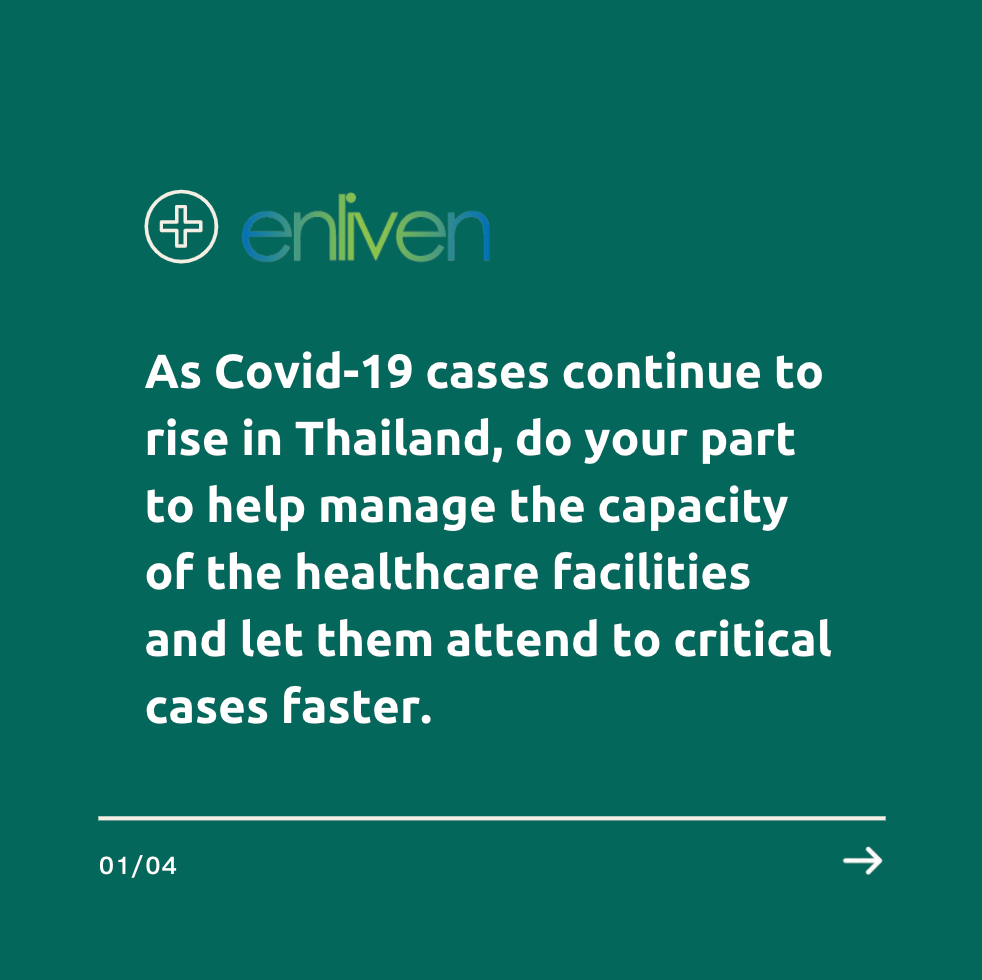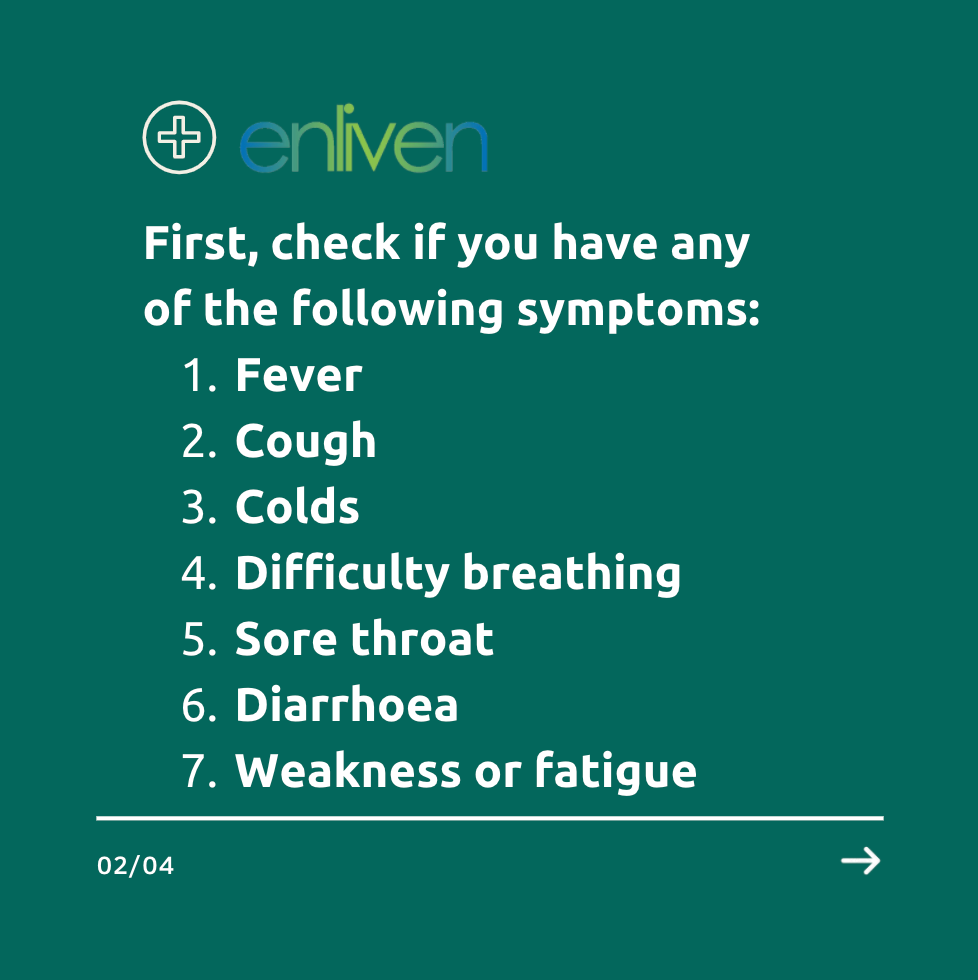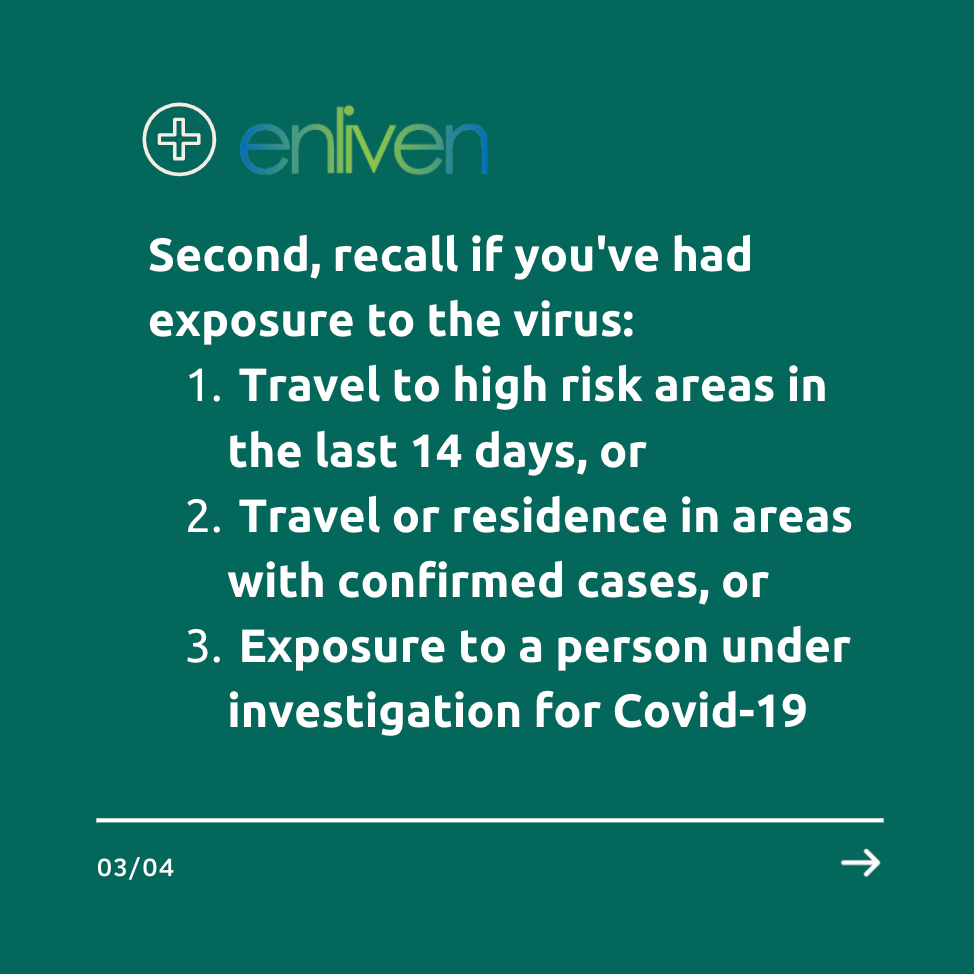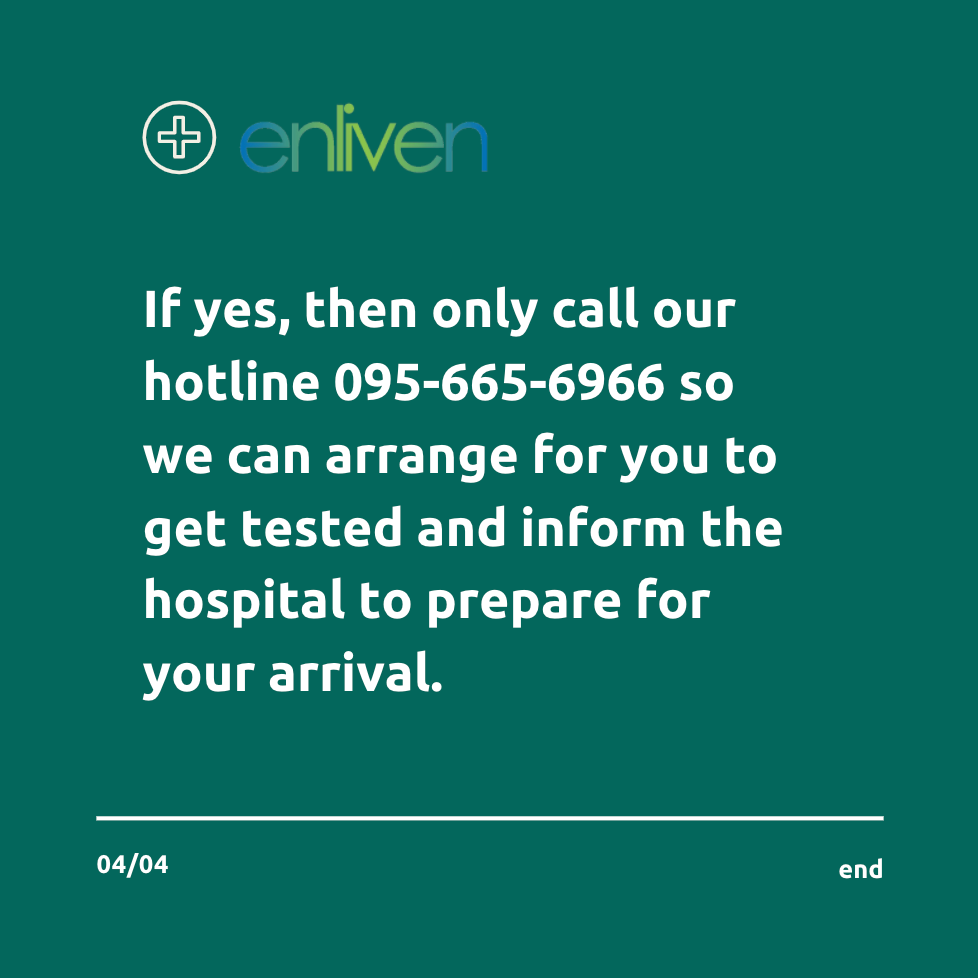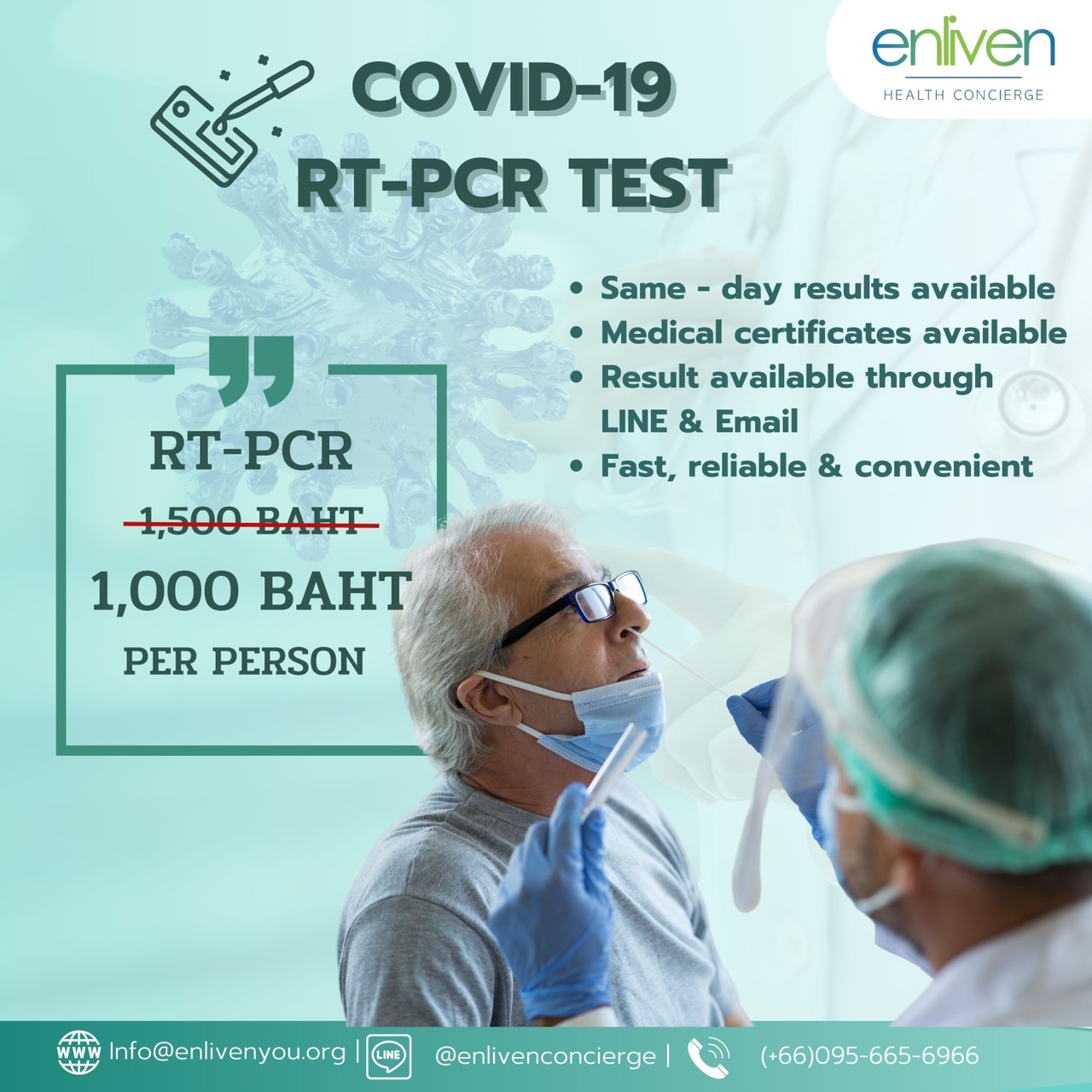by Admin | Jun 30, 2021 | Uncategorized
In light of the current COVID9 wave in Thailand and the overwhelm the healthcare system is experiencing, Enliven Health Concierge advises you to follow these steps before deciding to take a COVID19 Test. If you do need to take one, we are here to help arrange it!
– by Pirunrat Nathchayanonth (Yori), Client Coordinator
My children have Covid-19.
That’s not a sentence I thought I would be writing. My children have… tantrums, wrestling matches, a love for too much chocolate, more screen time than recommended. That’s what lockdown life in the pandemic has meant for us.
When their test results came back positive my initial reaction was: “If Covid doesn’t kill their nanny first, I will kill her myself.” I wept at the unknowns of this virus that could mark the lives of a two- and four-year-old that didn’t ask for any of this.
Our nanny had tested positive for Covid a few days earlier after experiencing terrible symptoms of fever, body aches and chills. Our house scrambled into action (of our own social responsibility as the BMA-operated hospital that diagnosed her did not track nor trace us for further testing – but that’s a different story). I decided to swab only the adults who had come into contact with her to avoid putting our young children through an uncomfortable and invasive procedure.
We received the results of our PCR test after a tense, sleepless night on a Sunday morning. All four adults were confirmed negative for the novel – but awful – coronavirus. We rejoiced! We talked about having a Covid-free party (joking only). Instead we ordered pizza and sensibly ate it privately in our home while relishing knowing we had escaped this disease for one more day.
That night my four-year-old son began having a fever. It’s probably some random illness related to the weather change, I told myself. If I – his mother – who shares more saliva air time with him than anyone in this world was Covid-negative there was no way he could have contracted it. Right? My denial was shook the next morning after he threw up the contents of his breakfast.
That afternoon my two-year-old daughter woke up from her nap with a fever. There could be no further delay – we arranged to get them tested the next day.
The private hospital called us two hours later around 11:30am with the children’s positive results. A hospital van – the sterile, plastic, cold Covid-mobile – would be picking us up at our residence around 3pm the same day to enter government-mandated isolation. Since the kids symptoms weren’t extremely severe they placed us in a “hospitel” for monitoring and treatment if necessary. My husband and I – although we tested negative – would be able to stay to take care of the kids due to their young age, a privilege that is not afforded to everyone but a health risk for us as well.
The swiftness of the hospital to remove my two positive blights from the general population must be commended. I never had a choice anyway. Home quarantine was not an option. At the time of writing, Thai government regulations decree that those who test positive via a PCR test must isolate for a minimum of 14 days at a hospital, field hospital or “hospitel”. That meant where and how my children would be cared for was out of my hands.
Every day we are bombarded with statistics of those who have contracted Covid. At first the numbers may have been faceless but I venture to say that everyone reading this now has probably been directly or indirectly affected by a Covid patient. Since the so-called third wave began in April 2021, the numbers reaching over 200,000 cases have only been increasing and the sought-after hospital beds only decreasing. Every so often we read that hospitals are temporarily suspending Covid testing because they simply don’t have the space and support to take in infected patients.
“We have been working with our private hospital partners to ensure all our patients get hospital beds once tested positive. There is a limited number of beds available, and the law currently states that anyone who tests positive is to be allocated a hospital bed. The situation we have now is that the severe patients are waiting for beds occupied by mild patients. If we prioritise patients with severe symptoms, the load on the already stressed healthcare system would be lessened, and the patients who truly need to be in the hospital to receive care would have a higher chance of getting a bed,” states Devi Bajaj, co-founder of Enliven Health Concierge, a local healthcare liaison that facilitates the medical care of patients.
Being here in a quarantine that was chosen for my children is adding a different layer to the crisis surrounding the pandemic. Why wasn’t the option for those with mild symptoms to self-isolate at home part of the initial plan to ease the burden on the healthcare system?
Every morning a nurse makes her rounds to our floor to check my children’s oxygen levels and temperature. We can hear the crinkling of her plastic PPE suit before she even reaches our door. Behind her N-95 mask layered with a face and hair shield is a healthcare worker doing 12 hour shifts. We want to feel reassured that she is here to ensure the optimal health of my children; but then we remember it’s Covid – she doesn’t want to come within six feet of us if she can help it.
Her gloves and feet coverings are securely and excessively taped to the protective gear so that not one cell of her skin is exposed to those with the virus. After she checks the patients on the floor, she must return downstairs, strip off all her equipment and the clothes underneath, take a shower and put on new clothes and a new suit again. After they escort a new patient in, the nurses must bathe and change their clothes as well. Some healthcare workers here say they can last maximum two hours in the suit, but they are stifled and stuffed underneath. I see droplets of moisture forming inside the plastic protecting the nurse’s feet and tension in the face behind her barriers.
A paediatrician at a leading private hospital in Bangkok, speaking on the condition of anonymity, offers insight into the government-mandated quarantine: “The number 14 is the guideline experts are using for the whole country to track [Covid] symptoms and its contagion. If patients go back home we cannot control their quarantine and ensure they will stay home. There are economic factors for lack of [home] quarantine here. Not everyone can stay home for 14 days because they need to go out and make money.”
The construct of “home” is different based on your status. Within one night of being removed from our surroundings, I felt my children would suffer far worse consequences being holed up for 14 days in an uncommon environment than if they were allowed to safely isolate at our house.
I started making calls to their doctors and various hospital representatives that if the children’s X-rays and blood tests came back optimistic and their symptoms decreased, we wanted to responsibly and legally pursue the option to go back home and finish up the days left of our quarantine. The answer has been a hard no.
The blanket regulation of government-ordered isolation surrounding all Covid patients completely eliminates mental health support for adults and children. It also doesn’t take into account socioeconomic factors for those who can’t afford to be removed from their lives for two weeks or to work from home. That’s why many are not opting to get tested officially at hospitals so they can continue to try to earn to support themselves and their family.
This government policy is also a direct insult to their confidence of the Thai people; do they believe we are all so untrustworthy that we think being in “quarantine” means we can still walk to 7-Eleven and buy a hot dog?
But in a pandemic there is no room for individuals; only statistics to do what is deemed best for the greater good.
As the government continues to propose misguided lockdown measures, delayed and limited vaccines and general miscommunication, their insistence of state-controlled quarantine and lack of other options is coming at the risk of the population’s sanity.
“Patients do need open air and sunlight. If we can provide that safely, it would be good in this crisis. As more kids are getting Covid, they need more support. A hospital’s job is to make the children’s ward as similar to home as possible and parents must make sure [their kids] don’t feel like they are being punished. We need a better solution for the safety of everyone in the realm of mental health,” the paediatrician adds.
We try not to count the days. My son drives his toy police car around the bed over and over. He doesn’t realise we are actually the ones being jailed.

by Admin | Jun 21, 2021 | Uncategorized
– by Pirunrat Nathchayanonth (Yori), Client Coordinator
Around 30% of fertility problems originate in woman. Female fertility problems include irregular ovulation, blockages in the fallopian tubes, and abnormalities of the uterus such as fibroids and endometriosis. Treatment options include surgery, hormone treatment and IVF (in-vitro fertilisation).
– Better Health Channel (https://www.betterhealth.vic.gov.au/health/ConditionsAndTreatments/infertility-in-women)
The most common causes of female infertility include problems with ovulation, damage to fallopian tubes or uterus, or problems with the cervix. Age can also contribute to infertility because as a woman ages, her fertility naturally tends to decrease. – American Pregnancy Association (https://americanpregnancy.org/getting-pregnant/female-infertility-70973/)
This can be frustrating to many people, not only for the females but also for their partners, so we suggest getting a fertility test to know where you stand.
With our latest partnership, we would like to introduce you to YesMom Fertility (https://yesmomfertility.com/index.php) – a kit that lets you understand your fertility better so that you can manage it more effectively.
But why do you need a Fertility Profile Test?
Fertility profile test helps check levels of hormones that are responsible for women’s reproductive system and overall health. It can give a better picture of your menstrual health and ovarian reserve which can further underline if there are any conditions that need attention and your ability to get pregnant at a certain period of time.– YesMom Fertility

How does it work?
1) Request your test kit – Your test will be customized based on your birth control.
2) Collect your sample – You collect your sample with a simple finger prick & a prepaid courier will return it to a certified lab for you
3) Receive the profile –Your results are sent to your secure online account where you will will find reports that explain what they actually mean for you
The best part?The reports are made for you to understand easily, giving you actionable insights on what to do next to achieve your goal!
Head over to https://yesmomfertility.com/index.php now for more information and take a simple quiz to start off your journey.
You can grab your kits today for 3,699 by using the code ENLIVEN21, valid until 31 July 2021!

If you have further questions and would like to consult with one of our top women’s health specialists, we will be more than happy to assist. Give us a call anytime!
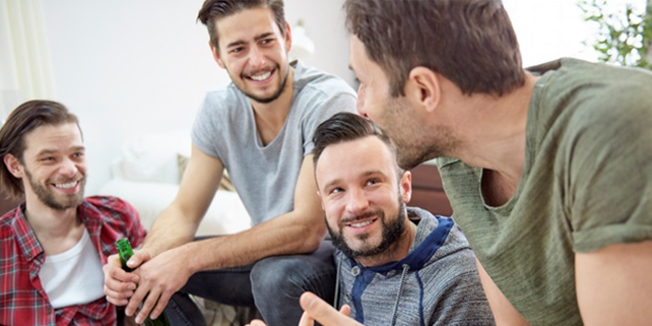
by Admin | Jun 16, 2021 | Uncategorized
– by Pirunrat Nathchayanonth (Yori), Client Coordinator

“Did you know that men are 80 percent less likely to use a regular source of healthcare, like a primary care physician, than women? In fact, a lot of men go to the doctor only if they’re sick or have a medical emergency. However, regular check-ups are important for preventing things like cancer, high blood pressure, heart disease and diabetes. If you haven’t had a preventative care check-up in over a year, it’s time to visit your doctor. Many diseases and conditions don’t have obvious symptoms but may put you at risk for heart attack or stroke.” – Pomona Valley Health Center (https://mypvhc.com/ways-improve-mens-health/)
80% is high and definitely not ideal! But why is that the figure? Perhaps, it has something to do with the myth that they’re being associated with the traits of being strong, resilient and unbreakable. It could be one of the reasons why they don’t ask for help because they don’t want to be seen as weak. But let’s stop this stigma! It is completely okay to ask for the help you need or even better, to prevent yourselves from being in a serious medical situation.
Here’s a few common health issues among men
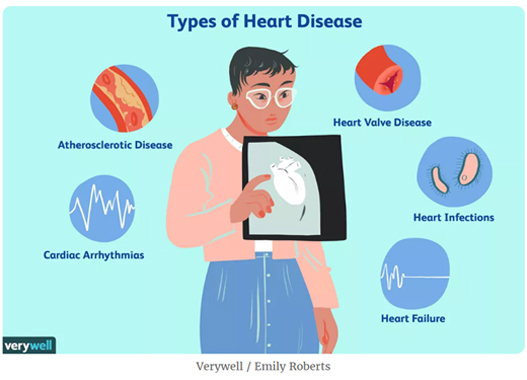
1. Cardiovascular disease (CVD)
According to WHO (https://www.who.int/news-room/fact-sheets/detail/cardiovascular-diseases-(cvds), Cardiovascular diseases (CVDs) are a group of disorders of the heart and blood vessels. They include:
- Coronary Heart Disease – a disease of the blood vessels supplying the heart muscle;
- Cerebrovascular Disease – a disease of the blood vessels supplying the brain;
- Peripheral Arterial Disease – a disease of blood vessels supplying the arms and legs;
- Rheumatic Heart Disease – damage to the heart muscle and heart valves from rheumatic fever, caused by streptococcal bacteria;
- Congenital Heart Disease – birth defects that affect the normal development and functioning of the heart caused by malformations of the heart structure from birth; and
- Deep vein thrombosis and pulmonary embolism – blood clots in the leg veins, which can dislodge and move to the heart and lungs.
Heart attacks and strokes are usually acute events and are mainly caused by a blockage that prevents blood from flowing to the heart or brain. The most common reason for this is a build-up of fatty deposits on the inner walls of the blood vessels that supply the heart or brain. Strokes can be caused by bleeding from a blood vessel in the brain or from blood clots.
Johns Hopkins Medicine (https://www.hopkinsmedicine.org/health/wellness-and-prevention/5-heart-health-mistakes-made-by-men-and-how-to-avoid-them) pointed out that CVD can also be a cause of your erection problems. They also pointed out that men develop coronary artery disease 10 years before women do. That means they tend to have heart attacks in their 60s—for women, it’s the 70s which coincides with Harvard studies in 2016 (https://www.health.harvard.edu/heart-health/the-heart-attack-gender-gap)

2. Respiratory Disease
World Population Review (https://worldpopulationreview.com/country-rankings/smoking-rates-by-country) has ranked 10 countries with the highest smoking rates and you’ll see that that majority of smokers worldwide are male. Therefore; the percentage of respiratory disease is also higher in men.
American Cancer Society(https://www.cancer.org/cancer/lung-cancer/about/key-statistics.html)pointed out that the lifetime chance of getting lung cancer is 1:15 in men and 1:17 in women. For smokers the risk is much higher, while for non-smokers the risk is lower. Although smoking isn’t the only contribute to this but still plays the biggest part.
I don’t smoke, and cigarette smoke often triggers my asthma which makes it difficult for me to be around my dad since he’s a heavy smoker. When I asked him why did he even smoke from the beginning, he said it was something that his friends did so he followed the trend and now it helps relieve his stress. What about you? What’s your reason? I’m just curious.
3. Diabetes
In Medical News Today (https://www.medicalnewstoday.com/articles/diabetes-affects-men-women#prevalence) research showed that men are almost twice as likely to develop type 2 diabetes as women. Why? CDC explains “As a guy, you’re more likely to get type 2 diabetes at a lower weight than women. One reason is that men store more fat in their bellies—a known risk factor. And more men than women have diabetes that’s undiagnosed; maybe it’s that “don’t want to hear bad news” thing.
We’d rather hear some bad news when it is still reversible, wouldn’t we?

4. Mental Health
According to Mental Health Foundation (https://www.mentalhealth.org.uk/statistics/mental-health-statistics-men-and-women) – “In 2018, there were 6,507 suicides registered in the UK, and in 2019, there were 5,691 suicides registered in England and Wales. Of these, three-quarters were among men, which has been the case since the mid-1990s.”
You may not like talking about your feelings or opening up about your vulnerability but we are here to remind you that you are not alone and it is completely okay to be vulnerable and seek professional help or any help, really. Men being able to discuss their feelings openly being judged or viewed by the “strong, resilient” label they were given is definitely a positive trend that should be aimed for from now on.
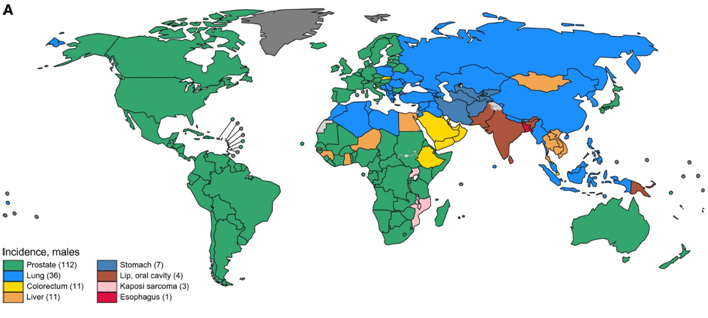
5. Prostate Cancer
“In men, prostate cancer is the most frequently diagnosed cancer in 112 countries, followed by
lung cancer in 36 countries, and colorectal cancer and liver cancer each in 11 countries. With regard to mortality, lung cancer is the leading cause of cancer death in men in 93 countries, in part because of its high fatality rate,21 followed by prostate cancer (48 countries) and liver cancer (23 countries).” – American Cancer Society (https://acsjournals.onlinelibrary.wiley.com/doi/full/10.3322/caac.21660)
According to the National Cancer Institute (https://seer.cancer.gov/statfacts/html/prost.html), approximately 12.5 percent of men will be diagnosed with prostate cancer at some point during their lifetime, based on 2016–2018 data. Even though the survival rate is at 97.5%, it is not something you want to associate with so we recommend to go for a regular prostate health screening.

These are just some examples of what men’s health issues. We’d like to reiterate that your health, should be your priority. When you take good care of yourself, only then will you have the strength to take care of others around you.
You also have some certain health issues that require regular check-ups just like the ladies. So if you haven’t scheduled a check-up in a long time, we strongly encourage that you do it now. You can always call us if you need assistance regarding this. We are here to help.
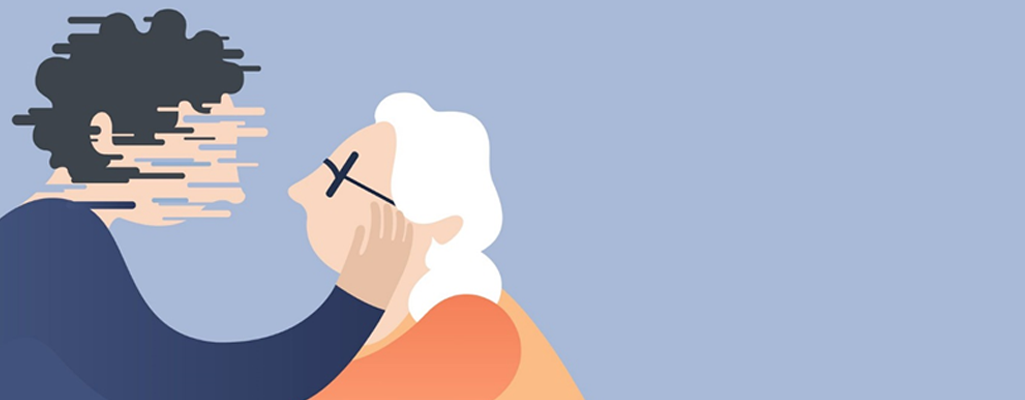
by Admin | Jun 10, 2021 | Uncategorized
– by Pirunrat Nathchayanonth (Yori), Client Coordinator

This topic touches me personally because my mom has Alzheimer’s disease and it started as an early on-set, she was only 53 when she was officially diagnosed.
It was quite a scary experience for our family and it definitely was very emotional experience for me, personally as my mom is my everything. She’s my best friend, my mentor, my rock. She’s the strongest and most resilient person I know. She worked hard and set an excellent example for me so it was very hard for me to see her fading like that. It was even harder when she doesn’t recognize me anymore. But in order to honor her and many beautiful souls living through this experience worldwide, I this article hoping to share more common understanding of the condition and share how we can prevent it or deal with it if already diagnosed.
Let’s have a closer look at the data
Someone in the world develops dementia every 3 seconds. There are over 50 million people worldwide living with dementia in 2020. This number will almost double every 20 years, reaching 82 million in 2030 and 152 million in 2050. Much of the increase will be in developing countries. Already 60% of people with dementia live in low and middle income countries, but by 2050 this will rise to 71%. The fastest growth in the elderly population is taking place in China, India, and their south Asian and western Pacific neighbors.” – Alzheimer’s Disease International
(https://www.alzint.org/about/dementia-facts-figures/dementia-statistics/)

So what is Alzheimer’s?
“Alzheimer’s is the most common cause of dementia, a general term for memory loss and other cognitive abilities serious enough to interfere with daily life. Alzheimer’s disease accounts for 60-80% of dementia cases.” – Alzheimer’s Association (https://www.alz.org)
“Alzheimer’s is an irreversible, progressive brain disorder that slowly destroys memory and thinking skills, and eventually, the ability to carry out simple tasks. While the specific causes of Alzheimer’s disease are not fully known, it is characterized by changes in the brain—including amyloid plaques and neurofibrillary, or tau, tangles—that result in loss of neurons and their connections. These changes affect a person’s ability to remember and think.”- FDA U.S. Food and Drug Administration

(https://www.fda.gov/news-events/press-announcements/fda-grants-accelerated-approval-alzheimers-drug )
I wish this is something like a flu or some kind of infection that can be reversed or cured, but unfortunately it is not. People with Alzheimer’s or Dementia developed their stages differently. From one to another could take as little as weeks or as many as months or years. But it is not something you can reverse, and you have to learn to live with it and manage the condition to the best of your ability.
Main Cause of Alzheimer’s
“Alzheimer’s disease is thought to be caused by the abnormal build-up of proteins in and around brain cells. One of the proteins involved is called amyloid, deposits of which form plaques around brain cells. The other protein is called tau, deposits of which form tangles within brain cells.Although it’s not known exactly what causes this process to begin, scientists now know that it begins many years before symptoms appear.” – NSH UK (https://www.nhs.uk/conditions/alzheimers-disease/causes/)
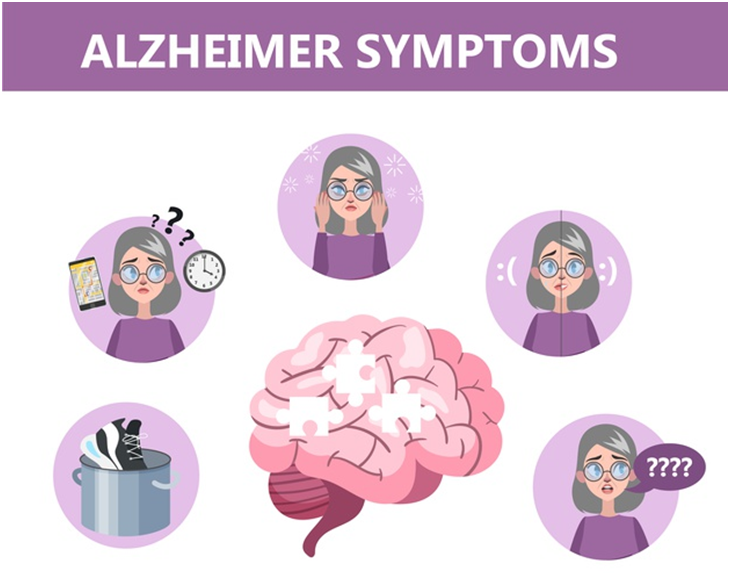
“There are also some other risk factors that could also increase your chance to having it such as age, family history, environment or even existing untreated illness. According to my mom’s neurologist, this could be genetic but we couldn’t know for sure because both her parents passed at a young age. I also believe it was something to do with her busy schedule while working, she barely had a day off, let alone a proper vacation. That combined with a fact that she was very introverted and reserved, she could have had untreated depression that we were not aware of.
But if it is something that took years to show, how can you tell if your loved ones are starting to experience it? If you are in doubt, lets’ look out for these 6 early signs.
- Memory loss that disrupts daily life – this could be something very simple and small to something really big. Sure we all forget a thing or two every now and then, but people with Alzheimer’s they forget things that they normally do routinely. This doesn’t only affect their life but could also be yours. My mom used to call me every 5 minutes after we hung up, to repeat the same conversation we just had earlier. That is about 12 phone calls in a span of an hour.
- Challenges in planning or solving problems – this can be a major struggle. Even deciding what to wear can be very challenging. Before she asked to stop working completely, she double-booked her boss in so many events and she couldn’t understand what went wrong. 2+2 is 4, but for her 2+2 is a jumble of figures – maybe the answer is 8.
- Difficulty completing familiar tasks – again, this can be any thing from small to big ones. Like I mentioned before they will forget things that they used to do on autopilot. My mom computer’s skill was on expert level, but when she was diagnosed she couldn’t even turn it on or shut it down. Even after I wrote down clear instructions, she couldn’t understand nor follow.
- Confusion with time or place – one minute they know what they were doing, the next they were completely lost. Unfamiliar places can make them feel very uncomfortable or even frighten them. As time goes by, a calendar will not mean anything to them as they won’t be able to understand it.
- Trouble understanding visual images and spatial relationships – they could find it’s difficult to read or understand certain colors like traffic signs.
- New problems with words in speaking or writing – you might be having a fruitful conversation with them and the next thing you know, they stopped in their track and couldn’t carry on. In the movie “Still Alice”, Alice (Julianne Moore) said “I can see the word hanging in front of me but I can’t reach them.” This is probably the best way to describe it.
Can it be prevented?

“As the exact cause of Alzheimer’s disease is still unknown, there’s no certain way to prevent the condition.” – NSH UK (https://www.nhs.uk/conditions/alzheimers-disease/causes/)
With all being said, I would like to encourage you all to have neurology check-up annually. It is always better to detect it early and figure out the right course of action for yourself or your loved ones. Although, the treatment or the cure is not there but we can always plan ahead of how life after prognosis can be. If you don’t know where to start, contact us and we will guide you.

by Admin | Jun 2, 2021 | Uncategorized
– by Pirunrat Nathchayanonth (Yori), Client Coordinator
It’s already June! Can you believe how fast time is flying?
Since March, we have been hearing many things about the Covid 19 vaccine and how the Thai government is handling the issue.
So, what do we know now regarding the Covid 19 vaccine plan for Thailand?
- The program has already been started focusing on high-risk groups and elderly
- The vaccines being administered currently are Astra Zeneca and Sinovac and the mass vaccination program will start on June 7th
While the private sector is trying their best to import Moderna as an alternate vaccine by the fourth quarter of this year, others like Pfizer and Sputnik V are being pushed to be approved by Thai FDA as I am writing this.

As new vaccines are developing, it’s no surprise that there will be concern regarding the efficacy because it was officially launched in such a short period of time, but we can guarantee you that the scientists have done thorough testing to ensure safety.
According to the World Health Organization, “COVID-19 vaccines are safe, and getting vaccinated will help protect you against developing severe COVID-19 disease and dying from COVID-19. You may experience some mild side effects after getting vaccinated, which are signs that your body is building protection.” (read more about side effects here https://www.who.int/news-room/feature-stories/detail/side-effects-of-covid-19-vaccines).

Let’s have a closer look on how effective these vaccines are (read a full article here https://www.yalemedicine.org/news/covid-19-vaccine-comparison).
AstraZeneca – Two doses, 4 to 12 weeks apart
Common side effects: Tenderness, pain, warmth, redness, itching, swelling or bruising at the injection site, all of which generally resolve within a day or two.
Sinovac(https://www.cnnphilippines.com/news/2021/4/20/Five-most-common-side-effects-AstraZeneca-Sinovac-vaccines.html) – Two doses, 2-4 weeks apart
Common side effects: elevated blood pressure, headache, injection site pain, dizziness, and rash
Moderna– Two shots, 28 days apart
Common side effects: Can include chills, headache, pain, tiredness, and/or redness and swelling at the injection site, all of which generally resolve within a day or two. On rare occasions, mRNA vaccines have appeared to trigger anaphylaxis, a severe reaction that is treatable with epinephrine (the drug in Epipens®). For that reason, the CDC requires vaccination sites to monitor everyone for 15 minutes after their COVID-19 shot, and for 30 minutes if they have a history of severe allergies.
Johnson & Johnson – Single shot
Common side effects: Fatigue, fever headache, injection site pain, or myalgia (pain in a muscle or group of muscles), all of which generally resolve within a day or two.
Today in Thailand, the vaccination program roll-out only starring two vaccines. And here is the infographic on how effective it is after you take it:
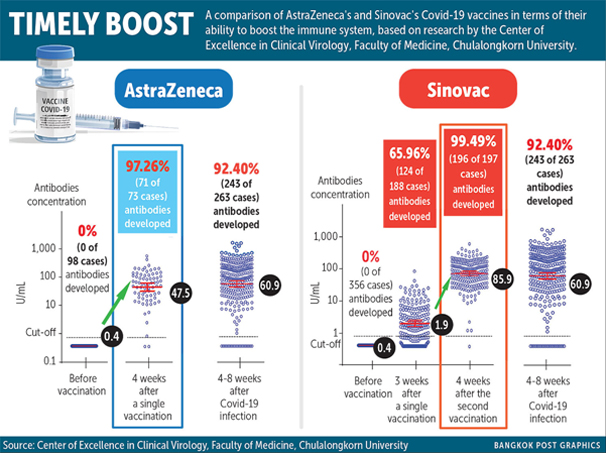
It would be wonderful to have more options, but with the current situation, it is highly encouraged from medical professionals and scientists to take the Covid 19 Vaccine that is available to you now so if you are given the opportunity to get it, please do take it!

by Admin | May 26, 2021 | Uncategorized
Continuing to celebrate our Mental Health awareness month in May, one of our partners -BNH- has kindly provided us with this amazing information written by one of their Psychiatrists,Dr. PiyapatChitpirom. Find out more about Psychological First Aid and how it can be implemented below.
Psychological First Aid (PFA)
During pandemic, psychological first aid is one of a useful skill which is helpful to relive psychological distress. Psychological First Aid(PFA) is about reassuring someone who is upset and assisting them in feeling safe and secure. It offers emotional support and assists people in meeting immediate basic needs, as well as locating information, resources, and social support.
What is Psychological first aid (PFA)?

- Assisting with emotional issues.
- Keeping people safe from further damage.
- Assisting someone in distress by making them feel safe and calm.
- Paying attention to people without prompting them to talk.
- Identifying and addressing needs and concerns.
- Assisting people in obtaining information, programs, and social assistance.
- Assisting in the provision of urgent necessities such as food and water, a blanket, or a temporary shelter.
What is NOT Psychological first aid (PFA)?
- Professional counseling or therapy.
- Making people feel compelled to share their feelings and reactions to a situation.
- Putting pressure on others to include more information about what happened.
- Encouraging an in-depth investigation of the condition that has triggered the anxiety.
Psychological First Aid: Who, When, Where?
- Who would get benefit from PFA?
- Distressed boys, girls, women, and men who have recently experienced a crisis event.
- Some people, such as those with life-threatening injuries or who are unable to care for themselves or their children, require more than PFA alone.

When should PFA be providing?
When encountering a distressed person, usually immediately after a crisis event
Where should PFA be providing?
Anywhere that is safe for both the helper and the affected person, preferably with some privacy as appropriate to the situation.
Psychological first aid action principles
PFA is a way of approach someone in need, determine what assistance he or she needs, and assist him or her in obtaining that help, according to the three action principles of LOOK, LISTEN, and LINK.
LOOK
- Determine who needs assistance.
- Determine the extent of any physical injuries.
- Determine the dangers to your safety and protection.
- Keep an eye out for emotional responses.
- Determine the immediate basic and functional requirements.
LISTEN
- Listen to people and help them feel safe.
- Ask about their needs and concerns; what you can help and what they need right now.
- Listen for sign of serious distress reactions.
- Be an active listener.
- Pay close attention to what the affected person says.
- If appropriate, gently touch the affected person’s hand or shoulder.
- Pay attention when people describe what happened. People will benefit from hearing their story.
- Do not interrupt them or try to reassure them that everything will be fine.
- Maintain constant eye contact and make sure your body language indicates that you are listening.

LINK
- Provide information that people should know related to the situation.
- Help them address their problems and deal with practical issues.
- Establish connections between people and their loved ones, as well as provide social support.
How to Help Responsibly?
- Adapt your actions to account for the person’s culture.
- Respect safety, dignity and rights
- Safety –Do not put people in danger; instead, make sure they are safe and protected from further physical or psychological harm as best you can.
- Dignity – People should be treated with dignity and in accordance with their cultural and social norms.
- Rights – act only in the best interests of the people, ensure equal access to impartial assistance without discrimination, assist people in asserting their rights and gaining access to available resources.
- Be aware of additional emergency response procedures.
- Take care of caregivers: practice self-care and team-care.
Credit
http://www.hhyp.org/downloads/HHYP_PFA_Youth.pdf
https://ifrcgo.org/ecv-toolkit/action/psychosocial-support-psychological-first-aid-pfa/
https://www.apa.org/practice/programs/dmhi/psychological-first-aid/resources
https://www.who.int/activities/ensuring-a-coordinated-and-effective-mental-health-response-in-emergencies
https://www.washingtonpost.com/lifestyle/wellness/pandemic-psychological-first-aid-anxiety/2020/09/21/7c68d746-fc23-11ea-9ceb-061d646d9c67_story.html
https://www.who.int/mental_health/world-mental-health-day/ppt.pdf
https://www.redcross.org.au/getmedia/dc21542f-16e4-44ba-8e3a-4f6b907bba6f/Psychological-First-Aid-An-Australian-Guide-04-20.pdf.aspx
https://ifrcgo.org/ecv-toolkit/action/psychosocial-support-psychological-first-aid-pfa/
https://www.sfadvancedhealth.com/blog/mental-wellness-self-care-tips?fbclid=IwAR3-6fTS6lhmfYAP2-0EBykMSOnyI5_ra2DTRfhCJZgGIMuGQj2zji2cVZY
Remember, you are not alone. If you are experiencing symptoms that affects your well-being in anyway, reach out to us! Call us at Enliven today to book your appointment with our experts in Mental Health, may it be BNH or others. We will get through it together 😊
Page 5 of 11« First«...34567...10...»Last »
